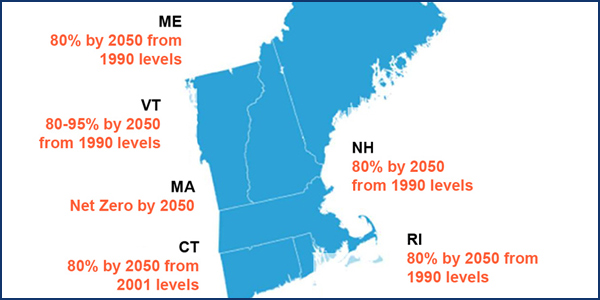The governors of Connecticut, Maine, Massachusetts, Rhode Island and Vermont released a joint statement Wednesday calling for reforms to ISO-NE, saying the RTO is frustrating their efforts to reduce economy-wide greenhouse gas emissions.
“Here in Rhode Island, we’re committed to reducing our greenhouse gas emissions and decarbonizing our future. I’m proud that we’re on track to achieving 100% renewable energy by 2030,” Rhode Island Gov. Gina Raimondo (D) said. But “in order to meet our shared clean energy goals and aggressively combat climate change, it’s clear we need to take a regional approach.”
The statement — signed by Raimondo, Connecticut Gov. Ned Lamont (D), Maine Gov. Janet Mills (D), Massachusetts Gov. Charlie Baker (R) and Vermont Gov. Phil Scott (R) — calls for reforms to ISO-NE’s market designs, transmission planning process and governance. New Hampshire Gov. Christopher Sununu (R) did not join in the statement.
A document outlining specific areas for reform will be released later this week through the New England States Committee on Electricity (NESCOE).
The governors said ISO-NE’s market design is “misaligned” with the states’ clean energy mandates and “fails to recognize the full value of our states’ ratepayer-funded investments in clean energy resources.”
They also said it lacks “a proactive transmission planning approach” to facilitate the increase in renewable and distributed resources.
Finally, they criticized the RTO’s governance structure, saying it “is not transparent to the states and customers it serves, with a mission that is not responsive to states’ legal mandates and policy priorities.” Unlike the other FERC-regulated grid operators, meetings of New England’s stakeholders, run by NEPOOL, are closed to the public.
“We have received the governors’ statement and look forward to engaging with the states and our stakeholders on these issues,” ISO-NE spokesman Matt Kakley said in response. “ISO New England, the New England states and market participants have a long history of working together to tackle the challenges facing the power system, and we expect that to continue.
“Maintaining reliable, competitively priced electricity through the clean energy transition will require broad collaboration, and the common vision of the New England governors will play an important role in the discussions currently underway on the future of the grid. We appreciate the New England governors sharing their regional vision to achieve a shared clean energy future and reaching out to ISO New England to help them achieve their goals.”
The governors’ statement is the latest evidence of increasing frustration by the states. (See Dykes Calls out ISO-NE, FERC on Carbon Pricing.)
Their attack on ISO-NE’s market design is also an implicit criticism of FERC’s regulation, which state officials say have hamstrung the ability of state-subsidized resources to compete in the capacity market. In March, ISO-NE CEO Gordan van Welie responded to criticism by several members of New England’s U.S. Senate delegation by backing carbon pricing but saying state officials need to signal their support before the RTO could act. (See ISO-NE: States Must Lead on Carbon Pricing.)
Each of the governors weighed in with their concerns.
“When Connecticut deregulated our electricity sector, we were promised competition, lower risk for ratepayers, more affordable electricity and a system that respects and accommodates our clean energy mandates,” Lamont said. “What we got is a system that has actively hindered our efforts to decarbonize the grid and imposed burdensome costs on Connecticut ratepayers to fix market design failures. Working together with our neighboring states, I’m committed to achieving a regional electricity grid that provides the affordable, clean and reliable electricity that Connecticut families and businesses deserve.”
Added Mills: “It is far past time that New England reforms how its electric grid is managed. The wholesale electricity markets must advance and support clean energy laws and policies, as the states demand decarbonization and markets and consumers support more renewables. ISO New England must keep pace with state priorities, and it must be more transparent and accountable in its decision-making, broadening its focus to include consumer and environment concerns as well as reliability and cost.”
Baker said: “To meet to our administration’s goal of net-zero emissions in Massachusetts by 2050, the commonwealth needs a regional electricity system that can support the delivery of clean, affordable and reliable energy to residents and businesses. My administration looks forward to working with our partner states, ISO New England and stakeholders to build a more transparent, modern and cost-effective power system that will allow New England states to meet our ambitious climate change and clean energy goals while creating a better future for our residents.”
Scott concluded: “I’ve long said our work to address climate change can and must also work to make energy more affordable for Vermonters, so I’m pleased to be a part of this regional approach to achieving both of these priorities. With a strategic, multistate approach, we can have a greater impact on both climate change mitigation and energy affordability.”
The five states said they will convene open and accessible forums to ensure that all interested stakeholders have an opportunity to participate in further refinement of the principles of the shared NESCOE document.





